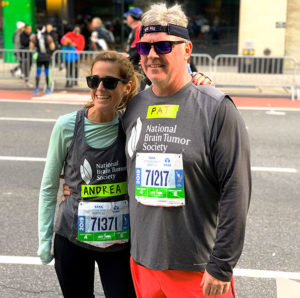By Lauren Schiffman, Contributing Writer

Photo/submitted
Westborough – It began just over two years ago while Westborough resident Andrea Levy was out for a walk. She wasn’t feeling well; she was dizzy, she was stuttering. Thinking her dizziness was caused by low blood sugar, she ate. Later that week, she still felt “off,” she said, with her speech coming and going. She called her doctor, who told her to go to the emergency room in the event she was having a stroke. Neurology examined her. They found nothing.
Fast forward several months. Levy continued to work, but her symptoms kept presenting themselves. While driving one particular day, Levy felt awful. She called her father and texted her husband, Patrick Burke, and said “something is really wrong.” Now, her head hurt. Her father contacted a neuro-ophthalmologist in New York who connected her with a neurologist in Boston.
After a battery of tests, including an MRI, the neurologist told Levy that she thought she saw a brain lesion. Another doctor disagreed.
Levy and Burke visited several neurosurgeons to get multiple opinions. Dr. Bob Cater, chief of neurosurgery at Mass. General Hospital, told Levy she had a meningioma, a usually benign brain tumor. It was fairly small and sat in her auditory canal, touching the nerves responsible for balance, facial sensation and hearing. Her doctors told Levy that, due to the location and size of the mass, she could live with it as long as she could tolerate her symptoms and her quality of life was bearable.
To do so, Levy tried between 20 and 30 different medications that were neither effective nor tolerable.
In the meantime, the plan was to monitor the mass via MRI every three months and eventually every six months. Each exam showed small but insignificant growth, which would likely continue, rendering it more difficult to remove. Additionally, if Levy opted to have the mass removed, she risked facial paralysis and hearing loss on that side.
The good news is that Levy’s last MRI was in August and showed that the mass is stable as compared to the MRI from March.
“I get to wait a year until my next one,” she said.
Initially, Levy quit running; she was afraid of what would happen if her symptoms presented themselves while she was on the road.
“I wasn’t used to the symptoms. I was scared I might fall or wouldn’t be able to see,” she said. “So I stopped running.”
But that hiatus did not last.
After her diagnosis, Levy joined several Facebook groups for people with brain tumor diagnoses and eventually learned about the Newton-based National Brain Tumor Society (NBTS). She and her sister decided to do a walk to help raise money for and awareness of brain tumor research, but Levy “didn’t want it to be ‘Andrea’s Walk.’” She found that the NBTS had a team that did exactly what Levy wanted to do – raise funds and awareness. She and Burke applied to the NBTS Boston Marathon team but found their way to the New York Marathon instead.
During their marathon training, Levy was recovering from a serious hip injury. While waiting for her medication to kick in, Levy “realized how ‘healthy’ running made me feel. On the days I got ‘sick,’ I’d love to remember that I ran x amount of miles either that day or yesterday. I thought that if I can do that, I’m much healthier than I feel at this moment.”
Training for the marathon was a physical challenge but “also exactly what I needed. Running the long distances really made me feel much less scared when those bad days come. I would realize how strong I must be and how healthy my body must be to do it.”
But the night before the race, Levy felt awful. Although she was nervous to run the next day, she knew from her training that if she felt “off” during the race, she could stop to take a rest. It’s what she and Burke did during their training.
“I try to let it not stop me from doing things,” Levy said. “I know that my symptoms will go away, and I don’t want to be in bed all day.”
Today, friends tell Levy that based on what they see on Facebook, she looks good. But Levy knows that “diseases you can’t see kind of make people uncomfortable. I want to raise awareness.”
To date, Levy and Burke, who also ran the marathon, have raised almost $12,000, with donations still coming in. To donate, visit https://nbtsevents.braintumor.org/fundraiser/2004847.














